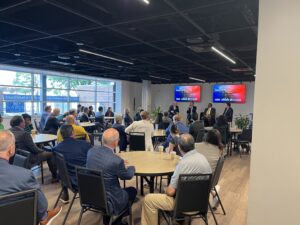(Dec. 14, 2016) Chattanooga, Tenn. — Collider launches to the public today at the Inside 3D Printing conference in San Diego, CA.
Collider pushes the boundaries of rapid production and manufacturing with its new technology, Programmable Tooling, which sets the standard for low volume production with a drop-in replacement for plastic casting.
Collider’s founder Graham Bredemeyer has an extensive history in 3D-printing and manufacturing. He spent several years consulting for manufacturers and 3D-printing providers and kept hearing the same complaints: customers wanted a dozen or a hundred products, but they didn’t want to spend thousands of dollars to cut a mold. He imagined a world without tooling costs, and recognized that 3D-printing would be the perfect complement. Thus, Programmable Tooling was born. This technology combines the best parts of plastic casting with the best parts of 3D-printing.
“We’re thrilled to bridge the gap between traditional manufacturing and 3D-printing,” said Bredemeyer. “At Collider, we believe that our technology will truly revolutionize end-use part production and the speed of innovation available in the manufacturing industry.”
Programmable Tooling is a hybrid process that first prints a hollow shell in photopolymer using continuous DLP lithography. Then, inside the same Collider machine, the shell is injected with traditional plastic casting materials. These two-part materials cure via a chemical process, the hollow shell dissolves in hot water and the end result is a production quality part. This process is proprietary and protected.
Customers can request material samples beginning in Jan. 2017 and submit parts for printing soon after.
By signing up for Early Access at collidertech.com, customers can request dedicated machine space, and be notified about release dates and material updates.
Collider is actively raising seed capital to fund expansion.
Collider’s Team
Collider has 5 founding members. Graham Bredemeyer, CEO and technology founder, was recruited to Chattanooga to launch the country’s first 3D-printing accelerator. He met the rest of the team through the local startup ecosystem. Collider is headquartered in the Business Development Center, an old ceramics factory turned business incubator on the NorthShore of Chattanooga, Tennessee.
Collider’s Timeline
June 2015: Bredemeyer’s first patent application, the beginning of Collider
December 2015: Funding secured from Asimov Ventures, Chattanooga Renaissance Ventures and other local angels
April 2016: Fully functional prototype machine completed
July 2016: First production quality part printed
November 2016: V1 machine completed
December 2016: Company and technology launch at Inside 3D in San Diego






